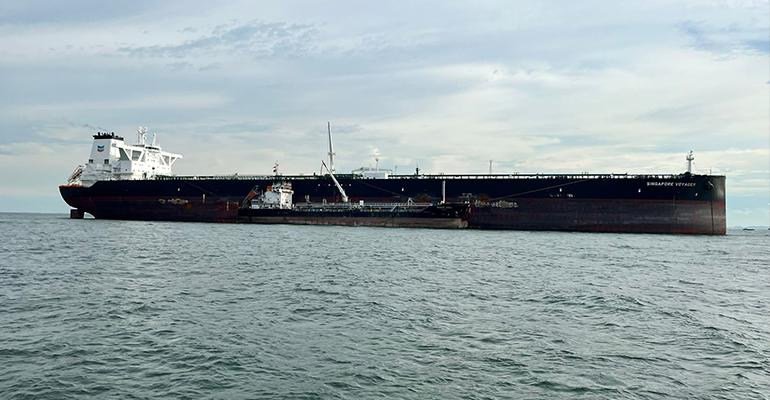CML concluded that Chevron’s Taro Ultra 140 cylinder oil and Veritas 800 Marine 30 crankcase oil can be successfully matched with a blend of biofuel and high sulfur fuel oil (HSFO).
With little industry experience for blends using cooking oil methyl ester (UCOME) with high sulfur fuel oil (HSFO) the tests mark an important breakthrough for the marine industry’s understanding of marine lubricants and biofuels compatibility.
Decarbonisation
The findings are a major landmark on the route to decarbonising the marine sector with the positive results providing assurances to vessel operators about the possibility of wider adoption of biofuels in the shipping industry.
The test program also underlined how CML can work with original equipment manufacturers to support their ambitions to adopt the greater use of lower carbon density fuels.
The latest trial is just the start – by partnering with original equipment manufacturers, customers and industry partners there will be further investigations into emerging fuels which offer low carbon intensity.
This includes analytical evaluation and testing programs of different biofuels which are currently available and their compatibility with different lubricants.
“These positive outcomes help build confidence that biofuels may have an important role in future marine fuel strategies,” said Matthew Lynch, Senior Manager, Global Lubricants Products and Technology at Chevron.
The platform for the latest tests was a Chevron-operated very large crude carrier (VLCC) on a voyage that followed bunkering with a Chevron-supplied blend of 80% HSFO and 20% UCOME, known as a B20 blend.
Taro Ultra 140 cylinder oil and Veritas 800 Marine 30 crankcase oil was used for lubrication in the Singapore Voyager’s MAN two-stroke 7G80ME-C9 main engines and Chevron also provided 500 tonnes of fuel.
The ship’s Hyundai Himsen H21/32 diesel generators were lubricated by Chevron Taro 50XL40 oil. An engine lubricant evaluation program on the main and auxiliary engines was carried out at the start of the test by CML in co-operation with Chevron Shipping.
Engine integrity
CML’s DOT.FAST drip oil service test kit was used to safeguard the condition of the cylinder and at the end of the voyage CML checks showed the engines sustained mechanical integrity.
Matthew Lynch added that the positive outcome “demonstrates that there is an opportunity to use Chevron’s engine lubricants in combination with biofuels and that when correct handling and monitoring procedures are followed engines should maintain their operational integrity.”
The tests were part of a three-month GCMD-led set of trials by five vessels and approximately 4,700 tonnes of biofuel blends, supported by two supply chains.
“The success of these trials helps build the foundation for change across the entire maritime value chain,” said Mark Ross, president of Chevron Shipping Company. “The challenges our industry faces are complex. We believe collaboration is key to our shared success in pursuit of a lower carbon future,” he added.
The pilot, which involved 19 industry partners, 13 vessels and both the Rotterdam and Singapore Ports, is part of a larger effort to establish an assurance framework for sustainable biofuel supply chains. Future work by GCMD and its partners is aimed at developing the framework to provide emissions abatement assurance for future synthetic and bio-derived drop-in fuels.
Collaboration
During the trials, Chevron specialists collaborated to strategize how to mitigate onboard risk as part of Chevron’s Marine and Powergen Decarbonisation project. Focused on studying and partnering with original equipment manufacturers, customers and industry partners, the project will continue to investigate emerging fuels with lower carbon intensity. This will include a detailed analytical testing and evaluation program of different biofuels currently available and their compatibility with lubricant options.
“These trials were developed to help with quantifying the quality, quantity and emissions abatement of biofuels” said Dr. Sanjay Kattan, GCMD Chief Technical Officer. He added:“The positive results from this trial will help increase user confidence and wider adoption, helping to drive lower emissions in the shipping industry.”
Copyright © 2024. All rights reserved. Seatrade, a trading name of Informa Markets (UK) Limited.
Add Seatrade Maritime News to your Google News feed.  |

